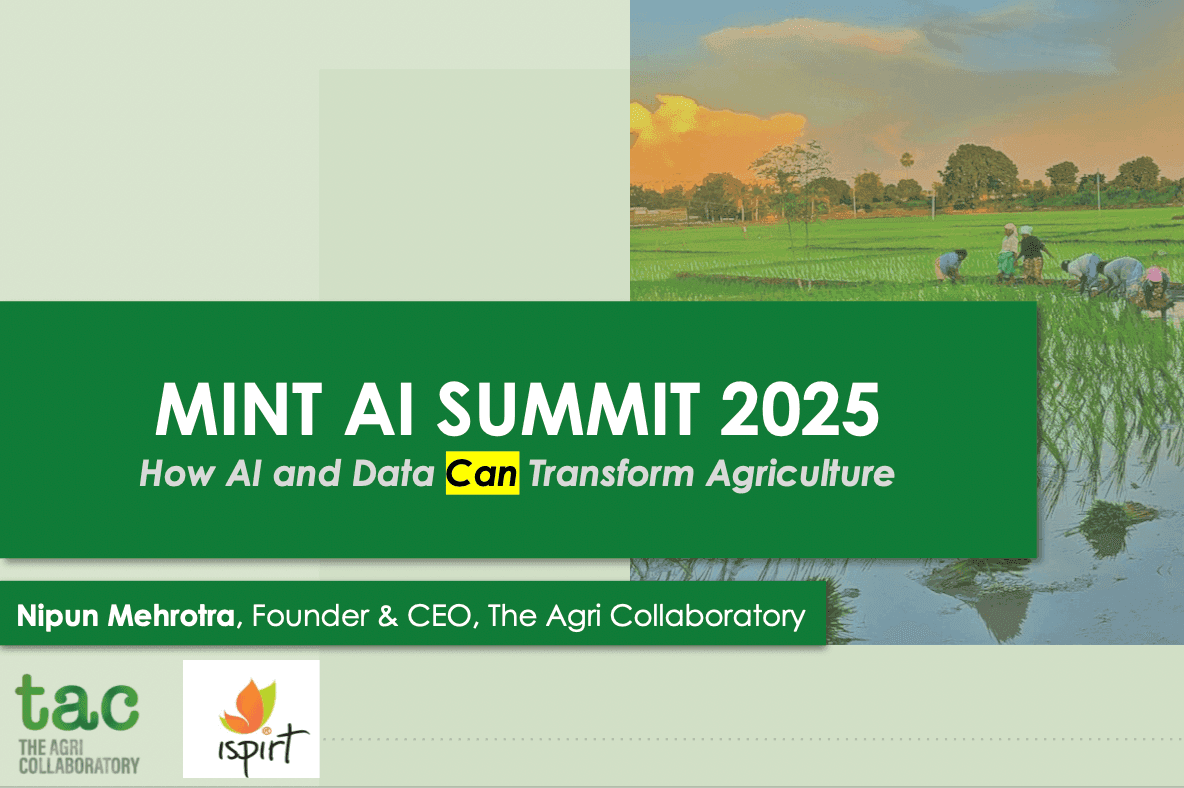
THE INDO FRENCH WORKING SESSIONS ON AGRI DATA
- November 30th, 2024
- In collaboration with : isprit
- Written By : The Agri Collaboratory
Objective:
The work sessions are meant to improve the understanding and collaboration between India and France on Digital agriculture and more specifically on leveraging the economic potential of Agri Data to help small farmers. The work group will share best practices suggesting actions and recommendations to be leveraged by the Public and Private sectors of both nations. India and France can potentially emerge as partners and lead in open digital innovation and infrastructure for digital agriculture.
Context | Motivation:
Farmers, especially Small & Marginal, Women & tenanted, struggle for timely access to finance, markets, modern technology, personalised advisories, across crop cycles, making it difficult to improve productivity and profitability.
These interconnected challenges are non-trivial, yet tremendous potential exists, as Countries, Governments, Academia and Private entities, Global foundations race to balance food security with climate change.
Digital Agriculture:
Agriculture is an incredibly complex sector, and one of the least digitized in India. Digitalisation of agriculture can improve productivity, crop selection, management, sustainability and reduce wastage. Indeed, digital agriculture in India has grown significantly with its market potential projected to be est. $24 B by 2025- but still modest Vs Agri GDP of est. $ 550 B.
Given its overall potential it is important for us to ensure an enabling framework for data, information and (domain) knowledge sharing to allow all players to succeed and grow. Additionally, the Agriculture sector is plagued by dozens of siloed software applications and islands of data, providing little benefit. Agriculture’s economic viability will improve via democratized and streamlined access to finance, advisory, supply chain and markets.
Inequitable approaches and low levels of farmer trust, leads to slow farmer consumption. Duplicated, siloed, efforts, limited access to “public infrastructure” (DPGs / DPIs), poor standardisation, interoperability and sharing of Agri Data, are some root causes why digital agriculture is not delivering to its potential and hence not benefiting small and marginal farmers at scale.
Data rich Agriculture:
We envision that Indian, and indeed global agriculture, can be transformed through digital innovations using AI and Data at massive scale ensuring food & nutrition security, optimizing price volatility, reducing wastage, climate protection with higher income for 140+ million farmers. Digital Public Goods and sharing of consented data through Agri data exchanges can be big enablers.
The value-chain is rapidly becoming digital, leading to an increasing amount of real-time data being generated - physical maps being digitized is one example, while another is the multiplicity of payment and Agri trading platforms and the rapid increase in “machine-data” generated by precision farming applications. With a focus on consent based data sharing adoption of Digital Agriculture is expected to scale.
The Central and State governments in India are building Digital Public Infrastructure for Agriculture. “The Agri Data Stack”, enables Digital identification of Farm, Farmer and Crop - driving digital adoption to benefit farmers. Key initiatives by Government, Academia and Non-profit organizations in Agriculture are paving the way for Private players to contribute.
Let’s Imagine a few data driven use cases for Shanti, a woman operating a small sized farm (~1 Hectare) in India:
- Turns farming into a sustainable and profitable venture by using personalised Agri advisory to choose, protect and manage her crop. She increases her income using predictive selling prices at the time of sowing.
- Receives collateral free timely working capital at low interest rates in minutes without having to visit the lender- by providing visibility to lenders of her activities across the crop cycle - sowing to harvesting, using her and her family’s digital footprints and alternate data sources, cash-flow and warehouse receipts.
- Avails subsidies, insurance, and extension services on innovative, environment friendly technologies and practices to improve farming efficiency (less water, higher yield, reduced inputs, waste). She also avails carbon credit for environmentally friendly practices, use of natural resources and climate friendly disposal of waste.
Current Challenges:
There is a vacuum with respect to Agri Data standardization, calibration, and certification causing data to be deemed un-trustworthy. The Govt. and the Agri ecosystem collectively need to establish transparent rules on Agri Data usage (ownership, access, monetization etc.), and Agri Data Interoperability (standardization, calibration certification) - improving “data-trust” to incubate new business models.
Digital agriculture’s first level challenges include awareness, connectivity, digital literacy, data access and collection costs, consent based access and data privacy. The next level of obstacles includes data sharing between private and govt, data standardisation to drive interoperability, and cyber security etc.
As per a report partners on “Unlocking Data Sharing in Agriculture” by IDH (a global foundation head quartered in Netherlands, that brings together public and private stakeholders to make global agricultural markets sustainable and inclusive) and its partners - key challenges in digital agriculture include:
- absence of comprehensive and dynamic policies and regulations to manage and mitigate risks;
- limited understanding on the motivation and incentives for different ecosystem players to participate;
- limited collaboration among ecosystem players for developing data standards;
- lack of capacities of stakeholders to improve quality and reliability of data;
- lack of capacity and understanding amongst farmers to share data using technology;
- lack of common methodologies and guidelines for data collection;
- high cost of data collection and acquisition;
- lack of understanding among data collectors on the purpose of data collection affecting the quality of data;
- absence of a user centric approach in data sharing;
- lack of digital public infrastructure for data exchanges;
- lack of a business case for open-data systems;
- lack of evidence on the business and impact case of data sharing.